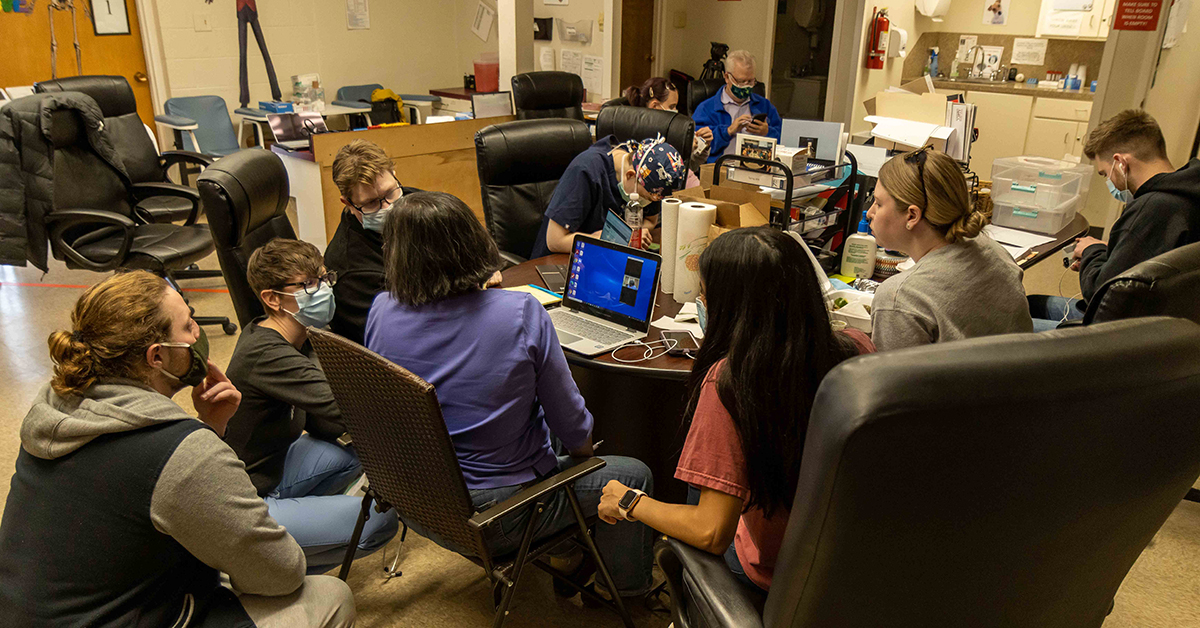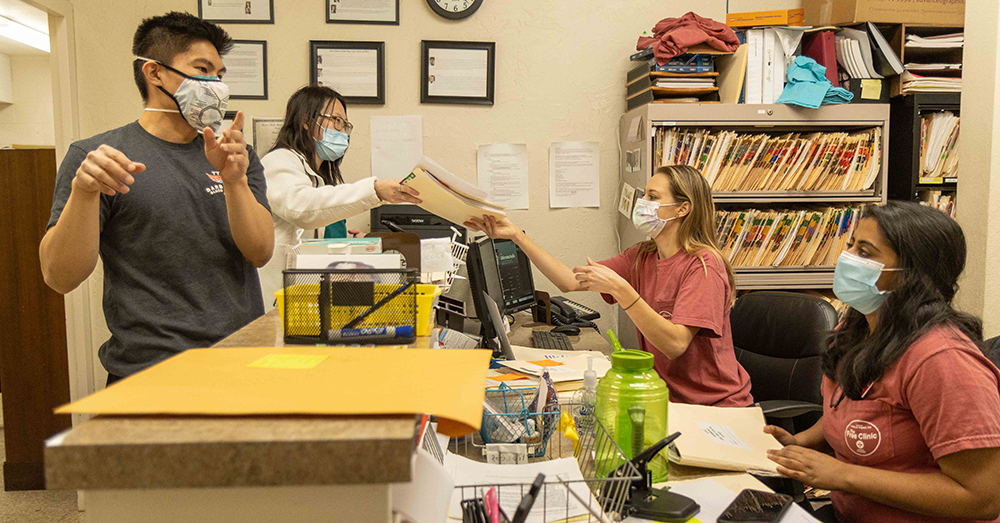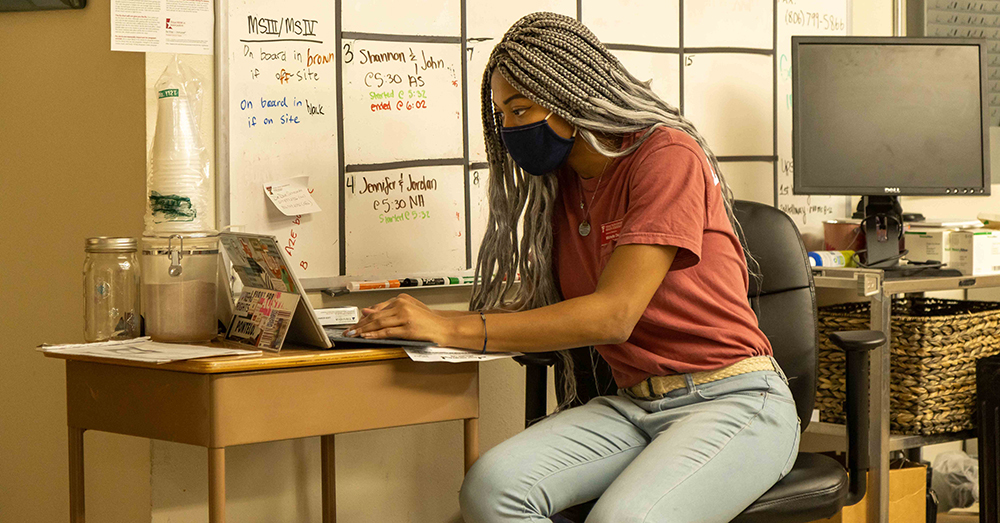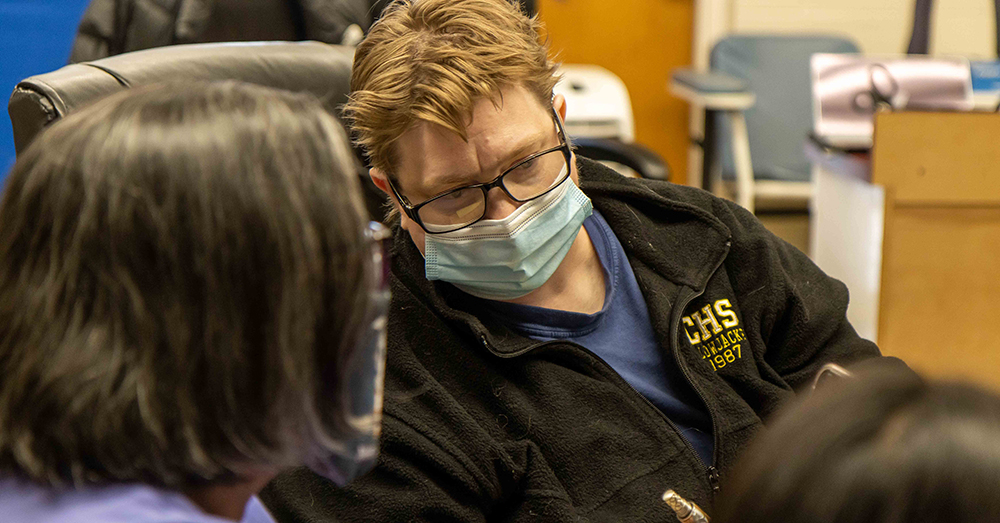When the Parking Lot Becomes a Health Clinic
Pandemic challenges The Free Clinic to provide health care through telemedicine

Audrey Garrett, who has diabetes, used to see a doctor in Levelland for her health care needs. But after her husband was diagnosed with cancer, the cost for visits and medications became overwhelming. She heard about The Free Clinic, a Texas Tech University Health Sciences Center (TTUHSC) student-run clinic that serves the at-risk population of Lubbock and the surrounding area. They both received access to health care and help with their medications.
The COVID-19 pandemic brought unprecedented challenges to health care. Garrett said she feared she would lose access to the health care she was receiving. For her closing the clinic would have devastating health consequences for her.
“I was afraid that they weren't going to be open and we weren't going to get help,” Garrett said. “I just figured I'd just quit taking my medicine. That's what most people would think—well, I'll just get off of it a while.”
Kelly Bennett, M.D., co-director of The Free Clinic and a family medicine physician at TTUHSC, remembers the day the pandemic brought the nation to a halt.

“When this all went down, Dr. Fiona Prabhu and I were actually at the yearly national Student Run Free Clinic Conference that happened to be in Orlando last year,” Bennett said. “And then the world fell apart. It came down. Everything's closed. The medical students are gone. It took us about two weeks of crying and gnashing of teeth to accept that this obviously is going to be a long-standing thing, and we have to have a plan.”
Before the pandemic, Bennett had used telemedicine at the TTUHSC Department of Family Medicine. She knew telemedicine worked. She and the leadership team at The Free Clinic met virtually to brainstorm, and decided ZOOM visits, similar to those at the TTUHSC clinics, could work. The only issue was that many patients at The Free Clinic had major obstacles in the way.
“I knew from my own experience at the department that a lot of people don't have smartphones, or they don't have computers or friends or family that have smartphones, or computers. Or even if they do, they are located somewhere that doesn't have Wi-Fi,” Bennett said. “We thought, well, we have to come up with something because a lot of these people are even less fortunate.”
Before the pandemic, 18% of the Lubbock population was uninsured and 22.5% were living below the national poverty line. The pandemic affected millions and the Lubbock area was not an exception. Jobs were lost and livelihoods were at risk with more individuals and their families falling into poverty levels and seeking affordable health care.

The Free Clinic was the one place that gave patients access to health care prior to the pandemic. Every Wednesday, The Free Clinic opened its doors at Lubbock Impact and provided free health services to 25-30 patients per night. Julie Chugh, The Free Clinic team student liaison and a TTUHSC School of Medicine student, said that with the pandemic, lack of access to technology was definitely an added barrier to their patient’s health care. The team was able to secure tablets through a donation from Cynthia Jumper, M.D. Now, patients who didn't have access to internet or a smart device, would be able to come on site for their health care.
“We serve patients who are strictly uninsured—no Medicare, no Medicaid,” Chugh said. “They're adults 19 to 64. It's a big resource out here in West Texas to serve a lot of patients that can't get medical care otherwise. We bring them in, talk to them and do what we can to get them free or discounted medications. It's been a really helpful resource to the community.”
The team moved quickly to implement the technology for their patients. Shortly after, telemedicine appointments were scheduled using ZOOM and technology that allowed them to follow HIPPA regulations.
“It actually became kind of cool because we were able to use medical students who weren't physically present in Lubbock,” Bennett said. “We had people home with their families in Dallas, or they were on the Amarillo campus or the Permian Basin campus, all being able to ZOOM in and talk to patients through telemedicine and help people.”

Many patients preferred to stay and do their visit from inside their car. Bennett said the team made sure that there was a mobile hotspot in the parking lot with enough Wi-Fi bandwidth. The first couple weeks were slow and only a handful of patients were seen. As time went on, the physicians and students started working out the logistics and seeing more patients.
Bennett said there was disappointment that the clinic has not been able to do the level of procedures and specialty clinics done in the past. But experiencing the pandemic with the leadership team, other medical students and health care professionals has been inspiring.
“Most of the kids go into medical school because they want to help people,” Bennett said. “They saw the pandemic as just more help that needed to be given. We've had to tell the students we can only have so many people here because of social distancing. If they were allowed to, they would have stampeded in to the clinic to help.”
Garrett said she was relieved to continue her clinic visits and knows the repercussions would have been detrimental to her health.
“If I would have stopped taking my medications, I would have lost my left toe because it was very infected,” Garrett said. “But with my medications, I got to keep my foot and my diabetes is under control. And I get all my lab works done for me. And it just keeps me going. I can live a better life.”
For the foreseeable future, The Free Clinic will stay open and continue using telemedicine. There are patients that need medication refills or that haven't been seen by a doctor since COVID-19 put a pause on the normal clinic set up.
“We just want our patients to know that we are still here to serve them as best we can, given the new regulations we have,” Chugh said. “We are looking towards reopening – not to full capacity – but to some extent in the summer.”
Related Stories
Celebrating Veterans: TTUHSC’s General Martin Clay’s Legacy of Service and Leadership
From his initial enlistment in the Army National Guard 36 years ago to his leadership in military and civilian health care management roles, Major General Martin Clay’s career has been shaped by adaptability, mission focus and service to others.
Texas Tech University Health Sciences Center School of Nursing Named Best Accelerated Bachelor of Science in Nursing Program in Texas
The TTUHSC School of Nursing Accelerated Bachelor of Science in Nursing (BSN) program has been ranked the No. 1 accelerated nursing program in Texas by RegisteredNursing.org.
TTUHSC Names New Regional Dean for the School of Nursing
Louise Rice, DNP, RN, has been named regional dean of the TTUHSC School of Nursing on the Amarillo campus.
Recent Stories
The John Wayne Cancer Foundation Surgical Oncology Fellowship Program at Texas Tech University Health Sciences Center Announced
TTUHSC is collaborating with the John Wayne Cancer Foundation and has established the Big Cure Endowment, which supports the university’s efforts to reduce cancer incidence and increase survivability of people in rural and underserved areas.
TTUHSC Receives $1 Million Gift from Amarillo National Bank to Expand and Enhance Pediatric Care in the Panhandle
TTUHSC School of Medicine leaders accepted a $1 million philanthropic gift from Amarillo National Bank on Tuesday (Feb. 10), marking a transformational investment in pediatric care for the Texas Panhandle.
Texas Tech University Health Sciences Center Permian Basin Announces Pediatric Residency Program Gift
TTUHSC Permian Basin, along with the Permian Strategic Partnership and the Scharbauer Foundation, Feb. 5 announced a gift that will fund a new pediatric residency.
